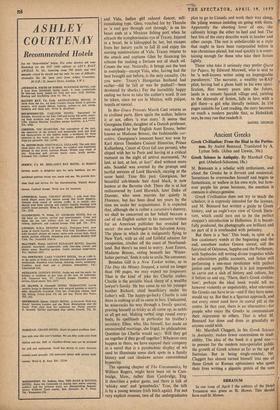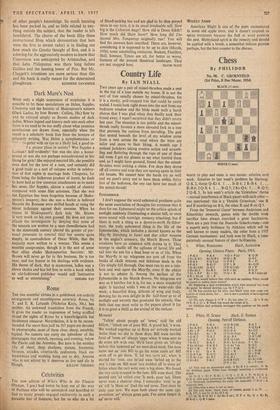Ancient Greeks
Greek Civilisation: From the Iliad to the Parthe- non. By Andr6 Bonnard. Translated by A. Lytton Sells. (Allen and Unwin, 30s.) M. BONNARD is a scholar with enthusiasm, and about the Greeks he is fervent and oratorical. Sometimes he overreaches himself and begins to fantasticate, or wallow in his own style, but how- ever purple his prose becomes, the emotion it contains is always genuine.
Greek Civilisation does not try to teach the scholars; it is expressly intended for the layman, and M. Bonnard has written a guide to Greek history, and an eagle's-eye view of Greek litera- ture, which could turn out to be the perfect shopper's introduction to Hellenism. It is beauti- fully produced, the photographs are brilliant and no part of it is overloaded with pedantry.
But there is a 'but.' This book, in spite of a few cautionary words at the beginning and the end, somehow makes Greece unreal, still the fairyland of Odysseus, Sappho and the Parthenon, with Sophocles still writing divine tragedies while he administers public accounts, and Solon still performing a one-man revolution with perfect justice and equity. Perhaps it is just impossible to carve out a slab of history and culture, lay it before us and say, 'There, that's Greek civilisa- tion'; perhaps the ideal book would tell us, however violently or unpalatably, what relevance the Greeks can have to us—and if they have none, would say so. But that is a Spartan approach, and not every sweet need have its moral pill at the centre. In that case, there is an alternative—for people who enjoy the Greeks to communicate their enjoyment to others. That is what M. Bonnard has done and done as gracefully as anyone could wish.
Mr. Marshall Claggett, in his Greek Science in Antiquity, makes fewer concessions to read- ability. The idea of the book is a good one— to present for the modern non-specialist public the growth of Greek science as far as the age of Justinian. But in being single-minded, Mr. Claggett has almost turned himself into one of those Greek or Roman epitomisers who spent their lives writing a gigantic pr6cis of the sum
of other people's knowledge, So much learning has been packed in, and so little related to any- thing outside the subject, that the reader is left bewildered. The charm of the book (like those instructional films which demonstrate that bats were the first to invent radar) is in finding out how much the Greeks thought of first, and it is sobering for the aggressively modern to know that Copernicus was anticipated by Aristarchus, and that John Philopanus was there long before Galileo and the leaning tower of Pisa. But Mr. Claggett's intentions are more serious than this and his book is really meant for the determined



































 Previous page
Previous page